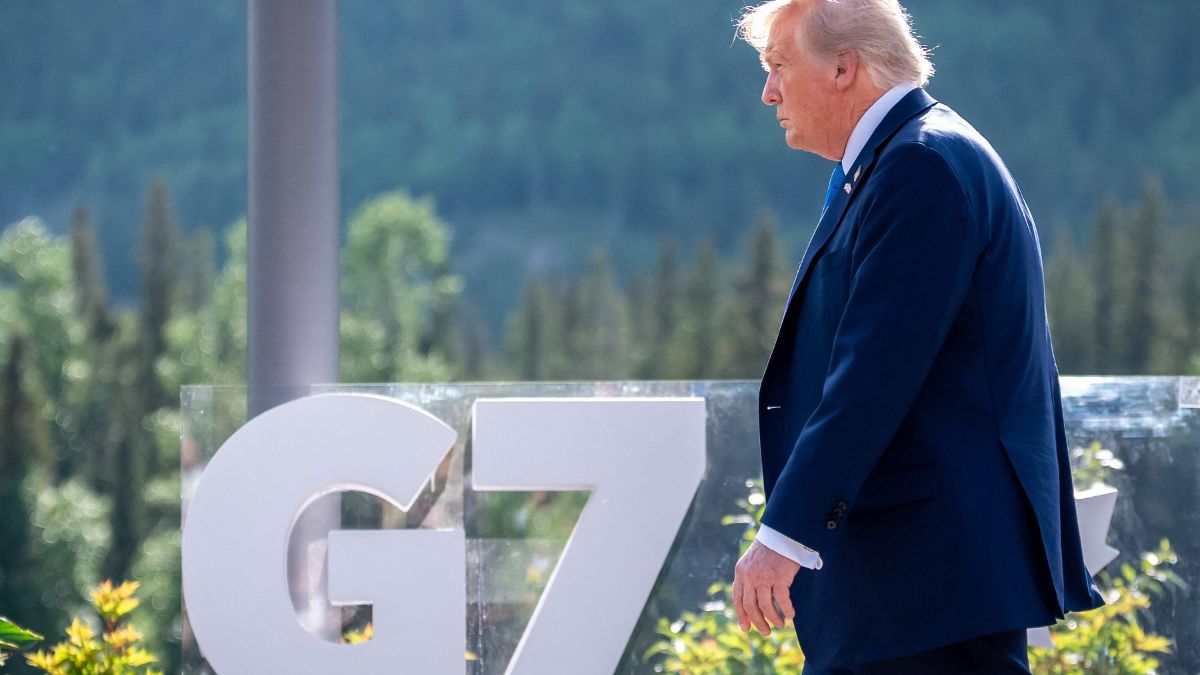US President Donald Trump abruptly leaves G7 summit in Canada as Iran-Israel war intensifies

President Donald Trump left the G7 summit in Canada a few hours ago to return to Washington and address the deepening conflict between Iran and Israel. Speaking at the summit in Kananaskis, Alberta, Trump told fellow leaders, “You probably see what I see, and I have to be back as soon as I can.” Canadian Prime Minister Mark Carney, the host, said he understood Trump’s decision. Secretary of State Marco Rubio was also returning with the president, a state department spokesperson confirmed.
The White House press secretary, Karoline Leavitt, said Trump’s early departure was due to “what is going on in the Middle East” but did not provide further details. The president is reported to have asked that the National Security Council be prepared to meet him in the Situation Room upon his return.
Trump’s departure came amid growing pressure from Israel for the US to intervene militarily in its campaign to destroy Iran’s nuclear programme. Israeli officials are urging Washington to deploy bunker-busting bombs capable of targeting Iran’s fortified Fordo nuclear facility, which lies deep underground. Only the US possesses the necessary 30,000-pound Massive Ordnance Penetrator and the B-2 bombers needed to deliver it.
While Trump has long opposed American involvement in foreign wars, he has also maintained that Iran must never possess nuclear weapons. “Simply stated, IRAN CAN NOT HAVE A NUCLEAR WEAPON,” he posted on his social media platform. He also suggested that diplomacy was still possible. “We’re talking. We have a thing called the telephone,” he said when asked if he would consider travelling to the region. “It’s always better to talk in person, but we’re talking.”
The president reportedly declined to endorse a joint G7 statement urging de-escalation, underscoring a widening gap between Trump and other world leaders on the crisis.
As the war entered its fifth day, Israeli jets continued their barrage across Iran, targeting military infrastructure, missile sites and key government facilities. On Monday, Israel claimed to have achieved full aerial superiority and struck the state television headquarters in Tehran while anchors were broadcasting live. It also attacked the Quds Force command centre and warned residents of northeastern Tehran to evacuate ahead of further bombing. The Israeli Defence Forces’ Arabic-language spokesperson, Col Avichay Adraee, issued the evacuation alert on social media, echoing the warnings previously seen in Gaza.
Iran responded by launching its ninth wave of ballistic missiles into Israel early Tuesday, hitting cities across the country, according to Israeli officials. Air raid sirens sounded throughout the night as Israeli defences attempted to intercept incoming projectiles. Residents were advised they could leave bomb shelters once the immediate danger passed.
Despite the violence, Iran’s foreign minister Abbas Araghchi signalled that Tehran remained open to negotiations. “If President Trump is genuine about diplomacy and interested in stopping this war, next steps are consequential,” he said. US officials said Vice President JD Vance and Middle East envoy Steve Witkoff had been encouraged by Trump to explore direct talks with Iranian representatives this week.
Meanwhile, Defence Secretary Pete Hegseth said US forces in the region remained in a defensive posture. “We are postured defensively in the region to be strong in pursuit of a peace deal,” he said. “We’re prepared, and we’ve messaged consistently that we’re there to defend our people and our assets.”
In Tehran, the impact of Israel’s strikes was becoming increasingly visible. The Imam Khomeini hospital, already overwhelmed since Friday, was described as a “bloodbath” by one of its doctors following Sunday evening’s air raids. Civilian casualties continued to mount as Israel expanded its campaign to include Iran’s oil and gas infrastructure.
In a sign of escalating intent, Trump warned on Truth Social that “everyone should immediately evacuate Tehran,” reiterating that Iran had missed an opportunity by not signing a deal proposed during the last round of nuclear talks.
Visiting his fighter pilots, Israeli Prime Minister Benjamin Netanyahu said the Israeli Air Force’s control of Tehran’s skies had shifted the nature of the war. “We are on the way to achieving our two objectives: eliminating the nuclear threat and eliminating the missile threat,” he said. “When we control the skies over Tehran, we strike regime targets, as opposed to the criminal Iranian regime which targets our civilians. We tell the people of Tehran to evacuate – and we act."
Middle East